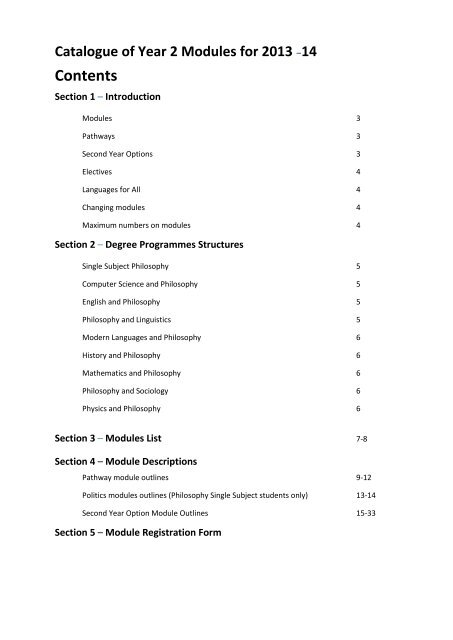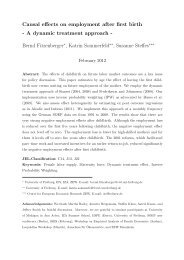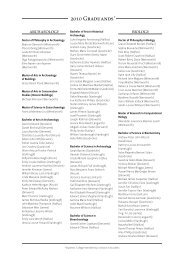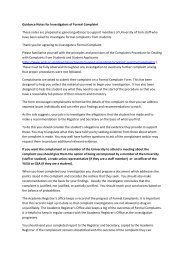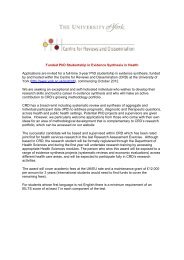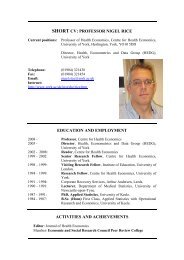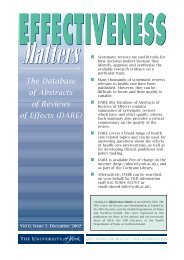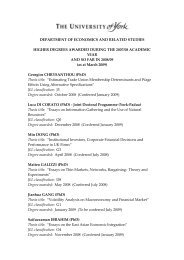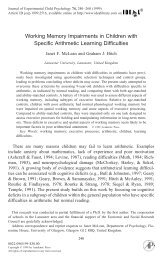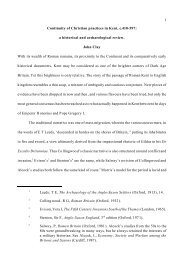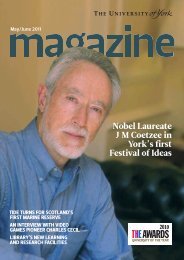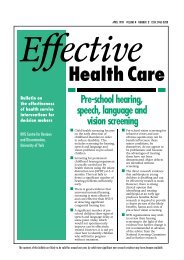Modules 2013-14 (Year 2) UPDATED (PDF ... - University of York
Modules 2013-14 (Year 2) UPDATED (PDF ... - University of York
Modules 2013-14 (Year 2) UPDATED (PDF ... - University of York
You also want an ePaper? Increase the reach of your titles
YUMPU automatically turns print PDFs into web optimized ePapers that Google loves.
Section 1 – IntroductionThis Catalogue sets out the Pathways and Optional <strong>Modules</strong> which will be available to present first yearstudents in their second year, <strong>2013</strong>-<strong>14</strong>. All current first year students, whatever their combination, shouldnow choose the Philosophy modules for their second year. These choices can be reviewed later, withcertain restrictions (see Changing <strong>Modules</strong> on the next page). Students should register their choices on thepink form at the back <strong>of</strong> this Catalogue.<strong>Modules</strong>You are required to check your choices with your Philosophy supervisor before handing in your registrationform. This form should be handed into the Philosophy Office by 4.00 p.m. on Friday 15th February<strong>2013</strong>. TheDepartment will be running a module briefing session in January to help guide you in choosing yourmodules. The session will show on your timetable and you are strongly advised to attend. You may alsoseek guidance from your supervisor.All philosophy pathways and modules taken in the second and third year are <strong>University</strong> assessed and counttowards your final degree classification.Pathways (30 credits)The Pathways introduce key issues in four central areas <strong>of</strong> philosophy: Knowledge and Reality Language and Mind Practical Philosophy History <strong>of</strong> PhilosophyThey are designed to aid development <strong>of</strong> core philosophical skills.Where a third year module recommends a particular second year Pathway, it will presuppose some, butnot all, <strong>of</strong> the material from that second year module. Students who have not taken the second yearPathway module will be expected to do a certain amount <strong>of</strong> extra reading.Reason & Argument and Beginning Philosophy are pre-requisites for all Pathways.Second <strong>Year</strong> Options (10 credits)Second year options give you an opportunity to broaden your knowledge <strong>of</strong> the discipline by taking shorter,more focused modules dealing with a particular area, topic or skill.Taster <strong>Modules</strong>These modules are designed to introduce a specialist area <strong>of</strong> Philosophy and are taught by weekly lectures,with two additional seminars during the term.Reading <strong>Modules</strong>These modules provide an opportunity for close study <strong>of</strong> a philosophical text and are taught by a weeklyreading group to discuss set reading. An additional tutorial will also be scheduled.Tutorial <strong>Modules</strong>These modules provide the opportunity to develop confidence in writing and discussing philosophy and aretaught by weekly tutorials in groups <strong>of</strong> three. You will be required to write regular essays to read anddiscuss in your tutorials, so there is an element <strong>of</strong> peer feedback.3
Presentation Skills <strong>Modules</strong>The aim <strong>of</strong> these modules is to develop the skills <strong>of</strong> giving presentations and chairing discussions. Teachingis by weekly seminars with students taking it in turns to present and chair.There are no pre-requisites for year two Options.Elective modules – (Please note that only students on the Philosophy Single Subject programme maytake an elective in their second year)Within the <strong>University</strong> Elective Module scheme the opportunity exists to substitute modules in otherdepartments for some Philosophy modules. If you wish to take any elective module you should first consultthe <strong>University</strong>'s Compendium <strong>of</strong> Elective <strong>Modules</strong>: http://www.york.ac.uk/admin/sro/electives.htm), seeyour supervisor, and then enquire in the relevant department whether space is available. Forms forelective registration are available from Carol Dixon in the Philosophy Office to whom the form must bereturned on completion by the Department <strong>of</strong>fering the elective.Languages for All – modules taught by the Language Teaching CentreThe opportunity also exists on some degree programmes to substitute Philosophy modules with Languagesfor All (LFA) modules. If you wish to take an LFA module you should first consult the LFA webpages:www.york.ac.uk/inst/ltc/lfa Please note that in the second year only students on the Philosophy SingleSubject programme may replace a Philosophy module with an LFA module to count for credit.Practical considerations (e.g. timetable clashes, over-subscription, or pre-requisites in the otherDepartment), may mean you are not able to get onto a specific elective or LFA module.The <strong>University</strong> imposes an upper limit on the number <strong>of</strong> credits you may take as Electives or LFAmodules. This is 40 credits over years two and three.Changing <strong>Modules</strong>Autumn and Spring TermsYou may change out <strong>of</strong> or into a module up to the end (i.e. 5pm on Friday) <strong>of</strong> the second week <strong>of</strong> teachingon that module but no later than that.Summer TermDue to the restricted number <strong>of</strong> teaching weeks in the Summer Term, Second <strong>Year</strong> 10-credit modules takenin the Summer Term cannot be changed once term has started. Requests for changes should be sent toCarol Dixon.Practical considerations, (e.g. timetable clashes and over-subscription), may mean you are not able to getonto a specific module, so the earlier you request the change the better.Only where there are exceptional reasons, such as illness, and with the permission <strong>of</strong> the Board <strong>of</strong> Studies,can you drop out <strong>of</strong> a module after the deadline.Maximum numbers on modulesPathways have no maximum number <strong>of</strong> students enrolled on them.All other modules are subject to a maximum number cap. It is imperative, therefore, that your pinkModule Registration Form at the back <strong>of</strong> this Catalogue is received by Carol Dixon by 4pm on Friday 15thFebruary <strong>2013</strong> (Week 6, Spring Term). All registration forms received by that date will have an equalchance <strong>of</strong> getting a place on the modules <strong>of</strong> their choice. If modules are oversubscribed, ballots will beheld and students who do not get on to the module will be contacted and asked to make alternativechoices.4
Section 2 – Degree Programme StructureYour choice <strong>of</strong> modules for the second and third years (Stages 2 and 3) is governed by the programmestructure for your degree programme (as detailed below) but there are two general rules which apply to allprogrammes:1. All students may take a maximum <strong>of</strong> 60 credits and a minimum <strong>of</strong> 20 credits in any term (a modulelasting more than one term is considered to have its credits spread evenly across its duration).2. All students should take 120 total credits in the second year, including credits taken in otherdepartments if they are combined students, and any elective modules.These rules are meant to protect you from over-burdening yourself. The credit value <strong>of</strong> a module reflectsthe time spent in teaching and learning.Philosophy Single SubjectStage 2 (120 credits)Students may choose from the following options:four Philosophy Pathways, orthree Pathways and 30 credits <strong>of</strong> 10-credit Philosophy Option/elective/LFA modules*, orthree Pathways and one <strong>of</strong> the two 30-credit Politics modules ‘Contemporary Political Philosophy’or ‘History <strong>of</strong> Political Thought’.*The <strong>University</strong> imposes an upper limit on the number <strong>of</strong> credits you may take as Electives or LFAmodules. This is 40 credits in total over Stages 2 and 3.Combined DegreesAll joint students should also consult the handbooks from their other departments. Degree programmestructures for PEP students are listed on the PEP website.Computer Science and PhilosophyStage 2 (60 credits in Philosophy) Students choose two Philosophy Pathways(Language and Mind Pathway recommended)English and Philosophy EQStage 2 (60 credits in Philosophy) Students choose two Philosophy PathwaysPhilosophy and Linguistics EQStage 2 (60 credits in Philosophy)Students choose two Philosophy Pathways (Language and Mind Pathway recommended)5
Philosophy and Modern Languages EQStage 2 (60 credits in Philosophy) Students choose two Philosophy PathwaysHistory and Philosophy EQStage 2 (60 credits in Philosophy) Students choose two Philosophy Pathways (History <strong>of</strong> Philosophy Pathway recommended)Mathematics and Philosophy EQStage 2 (60 credits in Philosophy) Students choose two Philosophy Pathways (Knowledge and Reality Pathway recommended)Philosophy and Sociology EQStage 2 (60 credits in Philosophy) Students choose two Philosophy PathwaysPhysics and Philosophy 3 <strong>Year</strong> BscStage 2 (40 credits in Philosophy) Students choose one Philosophy Pathway and one optionPhysics and Philosophy 4 year MPhysStage 2 (40 credits in Philosophy) Students choose one Philosophy Pathway and one option6
Section 3 – <strong>Modules</strong> ListPathway <strong>Modules</strong>Autumn <strong>2013</strong>, Spring 20<strong>14</strong> and Summer 20<strong>14</strong> (Terms 4-6)Module Code Module Name Stage Assessment Credits Page NoPHI00004I History <strong>of</strong> Philosophy 2 Essays and Exams 30 9PathwayPHI00001I Knowledge and Reality 2 Essays and Exams 30 10PathwayPHI00003I Language and Mind Pathway 2 Essays and Exams 30 11PHI00002I Practical Philosophy Pathway 2 Essays and Exams 30 12Politics <strong>Modules</strong> available to Philosophy Single Subject Students onlyAutumn <strong>2013</strong>, Spring 20<strong>14</strong> and Summer 20<strong>14</strong> (Terms 4-6)Module Code Module Name Stage Assessment Credits Page NoPOL00004I Contemporary Political 2 Essay and Exam 30 13PhilosophyPOL00005I History <strong>of</strong> Political Thought 2 Essay and Exam 30 <strong>14</strong>Second <strong>Year</strong> Option <strong>Modules</strong>Autumn <strong>2013</strong> (Term 4)Module Code Module Name Stage Assessment Credits Page NoPHI00013I Causation & Laws 2 Exam 10 17PHI00015I Formal Logic 2 Exam 10 18PHI00042I Imagination 2 Exam 10 21PHI00038I Reading Spinoza’s Ethics 2 Essay 10 24PHI00005I Research & Presentations Skills 2 Presentation& Report10 25PHI00041IPHI00010IThomas Nagel’s The View fromNowhereWittgenstein’s PhilosophicalInvestigations2 Essay 10 292 Essay 10 317
Spring 20<strong>14</strong> (Term 5)Module Code Module Name Stage Assessment Credits PagePHI00029I Advanced Writing Skills 2 Essay 10 15PHI00037I Analytic Aesthetics 2 Exam 10 16PHI00007I God & Morality 2 Exam 10 19PHI00017I Husserl’s Cartesian Meditations 2 Essay 10 20PHI00021I Paradoxes 2 Exam 10 22PHI00008I Philosophy <strong>of</strong> Time 2 Exam 10 23PHI00039I Scientific Realism 2 Essay 10 26PHI00040I Social Epistemology 2 Essay 10 28Summer 20<strong>14</strong> (Term 6)Module Code Module Name <strong>Year</strong> Assessment Credits PagePHI00028I Seeing Dark Things 2 Essay 10 27PHI00009I William James’s Pragmatism 2 Essay 10 30PHI00026IWomen Philosophers <strong>of</strong> theEarly Modern Period2 Essay 10 328
Section 4 – Module DescriptionsPathway Module OutlinesPHI00004IModule Title:Assessment Value:Duration <strong>of</strong> Module:HISTORY OF PHILOSOPHY PATHWAY30 creditsAutumn, Spring and Summer TermsStudents: <strong>Year</strong> 2Teaching Programme:Taught in four blocks, by weekly lectures and fortnightly seminarsAim:To chart some central themes <strong>of</strong> four great philosophers, Aristotle, Hume,Kant and Hegel. More particularly: Aristotle on the nature <strong>of</strong> substance and change Hume on scepticism and naturalism Kant on the distinction between appearances and things inthemselves, and its ramifications for scientific knowledge andmetaphysics Hegel’s absolute idealism and his phenomenology <strong>of</strong> spiritObjectives: To acquire a critical understanding <strong>of</strong> some key issues in the history<strong>of</strong> philosophy To develop core philosophical skills, including the careful and criticalreading <strong>of</strong> major historical texts in the disciplineContent Aristotle on natural and living substances; and on cause and explanation;Aquinas on being and essence (block 1) Hume on the origin and association <strong>of</strong> ideas; on scepticism and naturalism;and on mitigated scepticism (block 2) Kant on his Copernican revolution in metaphysics; on his defence <strong>of</strong> naturalscience and attack on Hume’s causal scepticism; and on his criticism <strong>of</strong> theclaims <strong>of</strong> metaphysics to prove the existence <strong>of</strong> God, the immortality <strong>of</strong> thesoul, and the freedom <strong>of</strong> the will (block 3) Hegel on absolute idealism and his criticism <strong>of</strong> Kant’s theory <strong>of</strong> knowledge; onhis conception <strong>of</strong> philosophical critique, together with an overview <strong>of</strong> hisPhenomenology <strong>of</strong> Spirit. (block 4)Summative Assessment:Block 1: essay submitted Week 7 <strong>of</strong> Autumn TermBlock 2: exam in Week 1 <strong>of</strong> Spring TermBlock 3: essay submitted Week 7 <strong>of</strong> Spring TermBlock 4: exam to be scheduled within Weeks 5-7 <strong>of</strong> Summer TermSuggested PreliminaryReading:J. Lear. Aristotle: The Desire to Understand. Cambridge <strong>University</strong> Press 1988. Seeesp. Ch. 2; Ch. 4, sec. 1; Ch. 6, secs. 3-6.D. Wiggins ‘Substance’, section 4 <strong>of</strong> Metaphysics in A.C. Grayling(ed.) Philosophy: AGuide Through The SubjectA. J. Ayer Hume: A Very Short IntroductionG. J. Warnock ‘Kant’ in The Great Philosophers by B. Magee (ed.)S. Houlgate ‘G. W. F. Hegel’ in Blackwell Guide to the Modern Philosophers: fromDescartes to Nietzsche by S. Emmanuel(ed.)9
PHI00002IModule Title:Assessment Value:Duration <strong>of</strong> Module:PRACTICAL PHILOSOPHY PATHWAY30 creditsAutumn, Spring and Summer TermsStudents: <strong>Year</strong> 2Teaching Programme:Aim:Objectives:ContentSummative Assessment:Suggested PreliminaryReading:Taught in four blocks, by weekly lectures and bi-weekly seminarsTo introduce key issues in moral philosophy, including: Metaphysical and epistemological concerns regarding values andmorality, The relation between the deontic and the evaluative domain, Competing ethical theories like consequentialism, deontology,virtue theory and contractarianism Historical background to contemporary debatesApplications <strong>of</strong> ethical theories to contemporary moral issuesBy the end <strong>of</strong> the module students should have: a critical understanding <strong>of</strong> key issues in moral philosophy an awareness <strong>of</strong> the relevance <strong>of</strong> moral philosophy in moraldebates developed core philosophical skillsThis module introduces students to three main areas in practicalphilosophy: meta-ethics, ethical theory, and applied ethics. The metaethicsblock deals with the realism/anti-realism debate in moral philosophyas well as with issues concerning moral motivation and moral reasons. Thenormative theory block focuses on debates between utilitarianism,Kantianism and deontology, virtue theory and contractarianism.Contemporary moral philosophy is strongly shaped by its history. Studentson this pathway will be introduced to some <strong>of</strong> the most influential works inthe history <strong>of</strong> moral philosophy. The last block will apply the conceptualand theoretical resources <strong>of</strong> philosophy to moral problems like thelegitimacy <strong>of</strong> affirmative action, or the death penalty, or pornography, theright response to world hunger, the protection <strong>of</strong> privacy or thejustifiability <strong>of</strong> wars.Block 1: essay submitted Week 7 <strong>of</strong> Autumn TermBlock 2: exam in Week 1 <strong>of</strong> Spring TermBlock 3: essay submitted Week 7 <strong>of</strong> Spring TermBlock 4: exam to be scheduled within Weeks 5-7 <strong>of</strong> Summer TermAristotle, Nicomachean EthicsKant, Groundwork to the Metaphysics <strong>of</strong> MoralsMill, UtilitarianismA Miller, An Introduction to Contemporary Meta-ethics, Polity 2003J Dreier, Contemporary Debates in Moral Theory, Blackwell, 2006.AI Cohen, C Heath Wellman, Contemporary Debates in Applied Ethics,Wiley-Blackwell, 2004.12
Politics Module Outlines(available to Philosophy Single Subject students only)Please note that this module is run and assessed by the Politics DepartmentPOL00004IModule Title:Credit value: 30Contact Hours: 39CONTEMPORARY POLITICAL PHILOSOPHYLectures:Seminars:<strong>14</strong> (7 per term, Autumn and Spring) & 2 revision (Summer term)16 (8 per term, 1 x 1hr plus 7 x 1.5hr, Autumn and Spring)Module Aims to develop in students a critical understanding <strong>of</strong> approaches to and problems in contemporarypolitical philosophy to develop students’ analytical, argumentative and communicative skillsModule Learning OutcomesBy the end <strong>of</strong> this module a student should: have a critical understanding <strong>of</strong> approaches to and problems in contemporary political philosophy have an ability to advance and analyse arguments in political philosophyFurther Module InformationWe commonly declare political arrangements to be just or unjust. For example, we might think that it isunjust that those who have worked hard and been successful in life should have to pay taxes to support theless industrious. Alternatively, we might think it unjust that some people get a better start in life thanothers (have richer parents, or better education), and we might therefore think that the state ought tocompensate those who are disadvantaged. But by what criteria do we decide that political arrangementsare just or unjust? What would a just society be like? And why?These are the central questions <strong>of</strong> this module. We shall address them via a detailed examination <strong>of</strong> some<strong>of</strong> the most important work on social justice to have been published during the past fifty years. In Autumnterm, we’ll carefully read the work <strong>of</strong> John Rawls, as well as looking at a range <strong>of</strong> important critical andsecondary material. In Spring term, we’ll examine some <strong>of</strong> the reactions and responses to Rawls’s work inthe years since the publication <strong>of</strong> his A Theory <strong>of</strong> Justice (1971), from libertarian, communitarian, feministand egalitarian critics. Other philosophers studied may include Robert Nozick, Susan Moller Okin, MichaelSandel, Charles Taylor, and G. A. Cohen.AssessmentOne procedural written assignment <strong>of</strong> up to 500 words during the Autumn Term.One essay <strong>of</strong> up to 2000 words counting for 40% <strong>of</strong> the module mark, due in the Winter assessment period(Monday week 1, Spring Term).One two hour closed examination counting for 60% <strong>of</strong> the module mark, taken in the Summer assessmentperiod (Weeks 5-7).Key TextsJohn Rawls, A Theory <strong>of</strong> Justice (Cambridge, MA: Harvard <strong>University</strong> Press, 1971/ revised edition 1999)and Justice as Fairness: A Restatement, (Cambridge, MA: Harvard <strong>University</strong> Press, 2001)Will Kymlicka, Contemporary Political Philosophy: An Introduction, (Oxford: Oxford <strong>University</strong> Press, 2002)13
Please note that this module is run and assessed by the Politics DepartmentPOL00005IModule Title:Credit value: 30Contact Hours: 39HISTORY OF POLITICAL THOUGHTLectures:Seminars:<strong>14</strong> (7 per term, Autumn and Spring) & 2 revision (Summer term)16 (8 per term, 1 x 1hr plus 7 x 1.5hr, Autumn and Spring)Module Aims to develop in students a critical understanding <strong>of</strong> important texts in the history <strong>of</strong> political thought to develop students’ analytical, argumentative and communicative skillsModule Learning OutcomesBy the end <strong>of</strong> this module a student should: have a critical understanding <strong>of</strong> some <strong>of</strong> the key texts in the history <strong>of</strong> political thought have an ability to advance and analyse philosophical arguments about political ideas.Further Module InformationThis module examines central texts by major political thinkers: Hobbes, Locke, Rousseau, Hume and Kant.These thinkers are acknowledged to have provided some <strong>of</strong> the classic literature concerning politics and itsrelation to life in general and moral life particularly. This module introduces and investigates their ideasand their arguments, their methods <strong>of</strong> argument, and the historical and political contexts in which theywere developed. Among the topics addressed are political obligation (why should one obey the law?), thecriteria for legitimate government, the meaning <strong>of</strong> freedom, the nature and justification <strong>of</strong> punishment,the role <strong>of</strong> private property, and various kinds <strong>of</strong> equality. All the thinkers studied here discuss some <strong>of</strong>these issues, and <strong>of</strong>ten they comment on one another’s ideas, either directly or by implication, sometimesnegatively and sometimes positively. Sometimes an idea stated embryonically by one thinker is taken overand refined or transformed by another, as with Rousseau and Kant. Accordingly, the study <strong>of</strong> one thinkerhelps to cast light upon the ideas <strong>of</strong> the others.AssessmentOne procedural written assignment <strong>of</strong> up to 500 words during the Autumn Term.One essay <strong>of</strong> up to 2000 words counting for 40% <strong>of</strong> the module mark, due in the Winter assessment period(Monday week 1, Spring Term).One two hour closed examination counting for 60% <strong>of</strong> the module mark, taken in the Summer assessmentperiod (Weeks 5-7).Key TextsThomas Hobbes, LeviathanJohn Locke, Two Treatises <strong>of</strong> GovernmentJean-Jacques Rousseau, Discourse on Inequality and Social ContractDavid Hume, Treatise on Human NatureImmanuel Kant, Political Writings<strong>14</strong>
PHI00029IModule Title:Assessment Value:ADVANCED WRITING SKILLS FOR PHILOSOPHY STUDENTS10 creditsDuration <strong>of</strong> Module: One term (Spring Term 20<strong>14</strong>)Students: <strong>Year</strong> 2Teaching Programme:There will be two 1-hour classes in weeks 2 and 6. Otherwise all the teaching isthrough individual feedbackProcedural Requirements: Attendance at classes Submission <strong>of</strong> all work by deadlines.Aim:This module aims to teach students the advanced writing skills necessary forwriting philosophy to a high standard. It will focus on using grammar, syntaxand vocabulary in a manner which makes for clear, precise and unambiguousexpression <strong>of</strong> complex and subtle thoughts.Objectives:Students should be able to write philosophical essays which are easy to readwhile maintaining the highest standards <strong>of</strong> accuracy <strong>of</strong> expression <strong>of</strong>philosophical views and arguments.ContentAssessment:Prerequisites:The classes will identify the main points <strong>of</strong> grammar and syntax which must betaken into account in order to avoid errors in philosophical writing and themost important resources which a philosophical writer can use. Students willwrite three essays over the term, each <strong>of</strong> which will receive detailed feedbackon the quality <strong>of</strong> the writing. The essays should be on philosophical topics butno feedback will be given on the philosophical content <strong>of</strong> the essays.Three essays; the first <strong>of</strong> 800 words; the second <strong>of</strong> 1,000 words and the third <strong>of</strong>1,200 words:1st essay (1%) due by Monday Week 3 Spring Term (submission by email tophilosophy@york.ac.uk), feedback returned by Monday Week 62nd essay (33%) due by Monday Week 7 (submission by email tophilosophy@york.ac.uk), feedback returned by Monday Week 103 rd essay (66%), due Tuesday Week 1 Summer Term (hard copy submission tobe handed in at Department Office).This module teaches specialist writing skills for philosophy and presupposesthat students already have an excellent standard <strong>of</strong> written English.Students for whom English is a foreign language are encouraged to take theCentre for English Language Teaching module 'Advanced Academic Writing'first. See: http://www.york.ac.uk/celt/students/advanced-writing/15
PHI00037IModule Title:Assessment Value:ANALYTIC AESTHETICS10 creditsDuration <strong>of</strong> Module: One Term (Spring Term 20<strong>14</strong>)Students: <strong>Year</strong> 2Teaching Programme:Procedural Requirements:Aim:Objectives:ContentWeekly lectures and two seminars across the term. Feedback onformative work.Attendance at all lectures and seminarsA critical study <strong>of</strong> selected topics from recent analytical aestheticsBy the end <strong>of</strong> the module, students should have acquired a criticalunderstanding <strong>of</strong>: some <strong>of</strong> the strengths and weaknesses <strong>of</strong> the application <strong>of</strong>analytical methods in philosophy to debates in aesthetics; a selection <strong>of</strong> fairly narrowly defined problems concerning artand aesthetic experience that have been subject to recentdebate.Students will be introduced to some <strong>of</strong> the issues taken up by analyticphilosophers in aesthetics. Indicative topics: definitions <strong>of</strong> art, theontology <strong>of</strong> art, aesthetic qualities, the value and truth <strong>of</strong> art, thenature <strong>of</strong> photographic and pictorial representation, the so-called‘paradox <strong>of</strong> fiction’ (how it is we can get emotionally involved withwhat we know to be ‘made up’), and the aesthetics <strong>of</strong> nature.Formative Assessment:Summative Assessment:Suggested PreliminaryReading (and Set Text):Practice exam due in Week 8 Spring TermA 1-hour exam in the Summer Term Assessment PeriodAesthetics and the Philosophy <strong>of</strong> Art: the Analytic Tradition: AnAnthology, eds. Peter Lamarque & Stein Haugom Olsen (Blackwell).Look at the introductions to the separate sections for preliminaryreading.16
PHI00013IModule Title:Assessment Value:CAUSATION AND LAWS10 creditsDuration <strong>of</strong> Module: One Term ( Autumn <strong>2013</strong>)Students: <strong>Year</strong> 2Teaching Programme:Procedural Requirements:Aim:Weekly lectures and two seminars across the term. Feedback onformative work.Attendance at all lectures and seminars.To introduce the topics <strong>of</strong> causation, laws <strong>of</strong> nature and therelationship between these two subject matters <strong>of</strong> philosophicalstudy.Objectives: Students should be able to demonstrate knowledge andunderstanding <strong>of</strong> the philosophical issues concerning the nature <strong>of</strong>causation and law, and the connection between them.ContentAfter considering the relationship between causation and law, we willconsider three theories <strong>of</strong> law – regularity, contingent nomicnecessitation, and powers – and the particular theories <strong>of</strong> causationthey support. We close with a brief look at causal relevance andcausal explanation.Formative Assessment:Summative Assessment:Suggested PreliminaryReading:A practice exam question due Friday Week 8A 1-hour exam in Week 1 <strong>of</strong> Spring Term 20<strong>14</strong>J.L. Mackie (1980), The Cement <strong>of</strong> the Universe (Oxford Scholarshiponline)17
PHI00015IModule Title:Assessment Value:FORMAL LOGIC10 creditsDuration <strong>of</strong> Module: One Term ( Autumn <strong>2013</strong>)Students: <strong>Year</strong> 2Teaching Programme:Procedural Requirements:Aim:Objectives:ContentWeekly lectures and two seminars across the term. Feedback onformative work.Attendance at lectures and seminars. Completion <strong>of</strong> exercises.To introduce a specialist area <strong>of</strong> philosophyBy the end <strong>of</strong> the module students should have mastered:- Pro<strong>of</strong> by natural deduction on first order quantifiedpredicate logic with identity- Model theory for first order quantified predicate logic withidentityThere are four stages to this module. We begin by learning theconcepts and tools <strong>of</strong> natural deduction in the easy case <strong>of</strong>sentential logic. We then see how truth-tables constitute asemantics for that logic. Next the natural deduction rules areextended to cover quantified predicate logic with identity. Finallywe show how to construct models – and countermodels – forquantified predicate logic with identity. The textbook we will use isLogic Primer 2 nd edition by Colin Allen and Michael Hand (MITPress). The assessment consists <strong>of</strong> a short exam during which youwill be required to construct pro<strong>of</strong>s and countermodels for sequents<strong>of</strong> sentential and predicate logic.Assessment:Suggested PreliminaryReading:A 1-hour exam in Week 1 <strong>of</strong> Spring Term 20<strong>14</strong>Logic Primer 2 nd edition by Colin Allen and Michael Hand (MIT Press)18
PHI00007IModule Title:Assessment Value:GOD AND MORALITY10 creditsDuration <strong>of</strong> Module: One Term (Spring 20<strong>14</strong>)Students: <strong>Year</strong> 2Teaching Programme:Procedural Requirements:Aim:Objectives:ContentFormative Assessment:Summative Assessment:Suggested PreliminaryReading:Weekly lectures and two seminars across the term. Feedback onformative work.Attendance at all lectures and seminars.To introduce a specialist area <strong>of</strong> philosophyBy the end <strong>of</strong> this module, students should be able to assess arguments concerning whether God could be the source <strong>of</strong>morality and arguments concerning whether God must be the source <strong>of</strong>morality.Does morality have a source? If so, is it God? The module focuseson whether God grounds morality through a debate betweenWilliam Lane Craig and Paul Kurtz and subsequent philosophicalcommentary found in Robert K. Garcia and Nathan L. King (eds), IsGoodness without God Good Enough? (Lanham, MD: Rowman &Littlefield, 2009). The debate concerns whether moral truths, moralvalues, and moral accountability must be grounded in facts aboutGod, such as his commands, his nature, and his judgements. Themodule then considers whether God could be the source <strong>of</strong> moralityby considering several arguments attempting to show that Godcould not be so. Such objections include: (i) if we are autonomousmoral agents, then God could not be the source <strong>of</strong> morality, (ii) ifthere are some necessary moral truths, such as that it is wrong totorture innocent children, then God could not be the source <strong>of</strong>morality, and (iii) that God, at least the God <strong>of</strong> the Hebrew andChristian Scriptures, could not be an appropriate source <strong>of</strong> moralitygiven the evil he commits. Through examining the debate and thecommentary it has produced, students are able to make up theirown mind on the relation between God and morality.Two 750-word answers to mock exam questions due on Friday <strong>of</strong>Week 8 <strong>of</strong> the Spring TermA 1-hour exam in the Summer Term Assessment PeriodWilliam J. Wainwright, Religion and Morality (Aldershot: Ashgate,2005)19
PHI00017IModule Title:Assessment Value:HUSSERL’S CARTESIAN MEDITATIONS10 creditsDuration <strong>of</strong> Module: One Term ( Spring 20<strong>14</strong>)Students: <strong>Year</strong> 2Teaching Programme:Procedural Requirements:Aim:Objectives:Weekly 90-minute reading group, mid-teaching tutorialAttendance at all sessionsTo enable a close study <strong>of</strong> a philosophical textBy the end <strong>of</strong> the module, students should have:A critical understanding <strong>of</strong> Husserl’s ‘transcendentalphenomenology’Developed key skills <strong>of</strong> close reading and criticismContentThis module introduces students to Husserl’s ‘transcendentalphenomenology’, focussing on his Cartesian Meditations: AnIntroduction to Phenomenology (1931). This is a rewarding (andchallenging) text, by the principal founder <strong>of</strong> the ‘phenomenological’approach to consciousness.Formative Assessment:Assessment:Suggested PreliminaryReading:500-750 word ‘reading response’ exercise for tutorialOne 2,500-word essay to be submitted on Tuesday Week 1 <strong>of</strong> SummerTermE. Husserl, Cartesian Meditations. Dordrecht: Kluwer, 1950.A.D. Smith, Routledge Philosophy Guidebook to Husserl and theCartesian Meditations. London: Routledge, 2003.D. Moran, Introduction to Phenomenology. London: Routledge, 1999.20
PHI00042IModule Title:Assessment Value:IMAGINATION10 creditsDuration <strong>of</strong> Module: One Term ( Autumn <strong>2013</strong>)Students: <strong>Year</strong> 2Teaching Programme:Procedural Requirements:Aim:Objectives:ContentWeekly lectures and two seminars across the term. Feedback onformative work.Attendance at all lectures and seminars.An examination <strong>of</strong> the role <strong>of</strong> the imagination in epistemology,philosophy <strong>of</strong> mind and aesthetics from historical and contemporaryperspectivesBy the end <strong>of</strong> the module students should have acquired a criticalunderstanding <strong>of</strong>: some historical accounts <strong>of</strong> the imagination,particularly those <strong>of</strong> Hume and Kant, some contemporary accounts <strong>of</strong>the imagination bearing on philosophy <strong>of</strong> mind and aestheticsThe module will examine the imagination in relation to epistemology,philosophy <strong>of</strong> mind, and aesthetics. (1) Consideration will be given tothe role <strong>of</strong> imagination in theories <strong>of</strong> knowledge, principally in Humeand Kant. (2) The nature <strong>of</strong> imagining as a mental act will be discussed,in particular as it bears on mental imagery and with regard to its ownlogical and phenomenological characteristics. (3) The role <strong>of</strong> thecreative imagination in aesthetics will be explored, in relation tocognitive theories <strong>of</strong> the arts, fictionality, and applications <strong>of</strong>simulation theory.Formative Assessment:Summative Assessment:Suggested PreliminaryReading:A practice exam question due Friday Week 8A 1-hour exam in Week 1 <strong>of</strong> Spring TermAlan R White The Language <strong>of</strong> Imagination, Basil Blackwell, 1990Mary Warnock Imagination and Time, Basil Blackwell, 1994Roger Scruton Art and Imagination, Methuen, 1974Jean-Paul Sartre The Psychology <strong>of</strong> Imagination, Citadel Press, 199121
PHI00021IModule Title:Assessment Value:PARADOXES10 creditsDuration <strong>of</strong> Module: One Term (Spring Term 20<strong>14</strong>)Students: <strong>Year</strong> 2Teaching Programme:Procedural Requirements:Aim:Weekly lectures and two seminars across the term. Feedback onformative work.Attendance at all lectures and seminarsAn exploration <strong>of</strong> some paradoxes which challenge our understandingObjectives: a general grasp <strong>of</strong> the nature <strong>of</strong> paradox a detailed knowledge <strong>of</strong> some paradoxical arguments an appreciation <strong>of</strong> the range and limits <strong>of</strong> our forms <strong>of</strong> reasoningContentWe will examine a selection <strong>of</strong> the paradoxes discussed in the set text(Sainsbury’s Paradoxes), in other words, chosen from the following:Zeno’s paradoxes, moral dilemmas, problems <strong>of</strong> vagueness,Newcomb’s paradox, the Prisoner’s Dilemma, paradoxes <strong>of</strong>confirmation, the unexpected examination, Russell’s paradox, and theLiar paradox.To help you decide on whether to do this course, just answer yes or noto the following two questions: (1) Will you answer this question in thesame way as the next? (2) Will you take this course?There will not be a surprise examination, but then again …Formative Assessment:Summative Assessment:Suggested PreliminaryReading (and Set Text):One exam answer due in Friday week 8 Spring TermA 1-hour exam in the Summer Term Assessment PeriodR. M. Sainsbury, Paradoxes, 3 rd ed., Cambridge UP, 200922
PHI00008IModule Title:Assessment Value:PHILOSOPHY OF TIME10 creditsDuration <strong>of</strong> Module: One Term (Spring 20<strong>14</strong>)Students: <strong>Year</strong> 2Teaching Programme:Procedural Requirements:Aim:Objectives:ContentFormative Assessment:Summative Assessment:Suggested PreliminaryReading:Weekly lectures and two seminars across the term. Feedback onformative work.Attendance at all lectures and seminars. Satisfactory preparation forlectures and seminars.To introduce a specialist area <strong>of</strong> philosophy, in this case themetaphysics <strong>of</strong> timeTo introduce students to some <strong>of</strong> the central philosophical questionsconcerning the nature <strong>of</strong> time, and enable students to engage criticallywith recent discussionIn this module we will consider some <strong>of</strong> the following centralquestions about time. Is time unreal? Can there be time withoutchange? What is the fundamental nature <strong>of</strong> temporal reality? Is thepresent moment ontologically special (e.g. is it that only present thingsexist), or do all actual times, past, present, and future, have equalstanding? Does time flow?One short essayA 1-hour exam in the Summer Term assessment periodMcTaggart, J. M. E. 1908: ‘The Unreality <strong>of</strong> Time’. Mind, 17, pp. 457–74.Prior, Arthur N. 1968: ‘Changes in Events and Changes in Things’, in hisPapers on Time and Tense (Oxford: OUP). Reprinted in Robin LePoidevin and Murray MacBeath (eds), The Philosophy <strong>of</strong> Time.Oxford, OUP, 1993, pp. 35–46.23
PHI00038IModule Title:Assessment Value:READING SPINOZA’S ETHICS10 creditsDuration <strong>of</strong> Module: One Term (Autumn <strong>2013</strong>)Students: <strong>Year</strong> 2Teaching Programme:Procedural Requirements:Aim:Objectives:ContentFormative Assessment:Summative Assessment:Suggested PreliminaryReading:Weekly 90 minute reading groupAttendance at all seminars; 500 word formative essayTo undertake a close reading <strong>of</strong> selected passages in BaruchSpinoza’s EthicsBy the end <strong>of</strong> this module, students should have acquired a criticalunderstanding <strong>of</strong>: the aims and methodology <strong>of</strong> the Ethics a selection <strong>of</strong> concepts, theses, and arguments in the EthicsBased on close textual study <strong>of</strong> Spinoza’s Ethics students willexamine some core theses: that God and Nature are one, thatordinary objects are mere ‘modes’ <strong>of</strong> substance, that things couldnot have been other than they are, that for every object there is acorresponding idea, that mind and body cannot causally interact,that the highest good is the intellectual love <strong>of</strong> God and how, onSpinoza’s view, humans can overcome the ‘bondage’ <strong>of</strong> theemotions and live free and worthwhile lives.One 500-word essay to be submitted in Week 6 <strong>of</strong> the Autumn TermOne 2,500-word essay to be submitted on Monday Week 1 <strong>of</strong> SpringTermThe text is The Ethics, by B. Spinoza, trans. Samuel Shirley (HackettPublishing). It is important that you have this edition (there areother translations) and you bring it to all meetings.24
PHI00005IModule Title:Assessment Value:RESEARCH AND PRESENTATION SKILLS10 creditsDuration <strong>of</strong> Module: One Term (Autumn <strong>2013</strong>)Students: <strong>Year</strong> 2Teaching Programme:Procedural Requirements:Weekly seminars and student-led presentations. Individual meetingsto advise on preparation and to give feedback on formative work.Regular attendance and participation in seminars. Giving and chairingshort presentations as formative work. Giving a 20 minutepresentation, chairing another and submitting a short report assummative work.Please note that all presentations will be recorded, and recordings willbe placed on the VLE for students on this module to review.Aim:Objectives:ContentSummative Assessment:Suggested PreliminaryReading:To develop the skills <strong>of</strong> researching and giving presentations andchairing meetings.To enable students to develop their skills in:- researching and giving a short presentation on a philosophicaltopic- responding to questions on their presentation- chairing a meeting and managing discussionIntroductory meetings providing guidance on presentation and onresearching a topic, followed by weekly student-led seminarsconsisting <strong>of</strong> presentations in different formats, plus discussion. Eachstudent should meet with the module convener in advance <strong>of</strong> theirassessed presentation to agree a topic and receive guidance onresearch.Assessment <strong>of</strong> the student’s autumn term presentation and chairing(60% and 10% <strong>of</strong> total marks respectively). A 1000 word writtenreport, reflecting on the student’s own presentation and three others(30% <strong>of</strong> total marks) due Monday Week 1 Spring 20<strong>14</strong>.Van Embden, J. and Becker, L. (2010). Presentation Skills for Students.London: Palgrave.Wisker, G. (2009) The Undergraduate Research Handbook. London:Palgrave.Warburton, N. (2004) Philosophy: The Essential Study Guide. London:Routledge (esp Chapter 3)25
MODULE CANCELLEDPHI00039IModule Title:Assessment Value:SCIENTIFIC REALISM10 creditsDuration <strong>of</strong> Module: One Term (Spring 20<strong>14</strong>)Students: <strong>Year</strong> 2Teaching Programme:Procedural Requirements:Aim:Weekly 90 minute reading group, mid-term tutorialAttendance at all seminarsBy the end <strong>of</strong> this module, students should have acquired a criticalunderstanding <strong>of</strong>: The main arguments in favour <strong>of</strong> a Realist account <strong>of</strong>scientific knowledge The main problems with a Realist account <strong>of</strong> scientificknowledge The alternatives to Realism and their strengths andweaknessesObjectives:In addition to gaining familiarity with this central problem inphilosophy, students should gain experience in understanding andanalysing philosophical arguments and in expressing their ideasclearly in speech and writingContentFormative Assessment:Summative Assessment:Suggested PreliminaryReading:One 500-word essay to be submitted in the second half <strong>of</strong> the termOne 2,500-word essay to be submitted on Tuesday Week 1 <strong>of</strong>Summer TermWe will read (portions <strong>of</strong>) two books: Bas van Fraassen’s TheScientific Image and either Peter Godfrey-Smith’s Theory and Realityor Michael Devitt’s, Realism and Truth.26
PHI00028IModule Title:Assessment Value:SEEING DARK THINGS10 creditsDuration <strong>of</strong> Module: One Term ( Summer 20<strong>14</strong>)Students: <strong>Year</strong> 2Teaching Programme:Procedural Requirements:Aim:Twice weekly 90-minute reading group, mid-teaching tutorialAttendance at all sessionsTo read and understand Roy Sorensen’s Seeing Dark Things (and possiblysome related papers).Objectives:Subject content To read and understand Sorensen’s book, and the significance <strong>of</strong> hisarguments for broader issues in metaphysics and the philosophy <strong>of</strong>perception.Academic and graduate skills To develop the skills necessary to read and critically engage with arecent philosophical text on an unusual and unfamiliar topic.Other learning outcomes (if applicable)ContentTo become confident and comfortable in developing your ownviews <strong>of</strong> a text and the issues it raises.Sorensen’s Seeing Dark Things is a fascinating and unusual book. In it, headdresses a number <strong>of</strong> different puzzles about intuitively negative entitiessuch as holes, shadows and silhouettes, arguing that we do perceive suchnegative things and that our perception <strong>of</strong> them is consistent with a causaltheory <strong>of</strong> perception.Each week we will read one or two chapters <strong>of</strong> the book and, (on occasion,and if appropriate) some other, supporting material.Discussion will be guided by a handout, produced each week by a student(or small group <strong>of</strong> students), to include a summary <strong>of</strong> the main points <strong>of</strong> theweek’s reading, and a short list <strong>of</strong> questions to be addressed.Formative Assessment:Assessment:Key Text:500-750 word ‘reading response’ exercise for tutorial2,500 word essay to be submitted on Monday Week 7 <strong>of</strong> the Summer TermSorensen, R. 2009. Seeing Dark Things. OUP.27
PHI00040IModule Title:Assessment Value:SOCIAL EPISTEMOLOGY10 creditsDuration <strong>of</strong> Module: One Term (Spring 20<strong>14</strong>)Students: <strong>Year</strong> 2Teaching Programme:Procedural Requirements:Weekly 90 minute reading group, mid-term tutorialAttendance at all seminarsAim: To read and understand contemporary philosophical papers insocial epistemology, including testimony, disagreement,expertise, judgement aggregation, and systems design. To develop students’ abilities to read closely and criticallyengage with contemporary philosophical texts.Objectives: To explain central arguments in social epistemology concerningtestimony, disagreement, expertise, judgement aggregation,and systems design To be able to engage critically with a complex philosophicaldialectic and to develop their own, considered view on it.ContentFormative Assessment:Summative Assessment:Suggested PreliminaryReadingWe live in an age <strong>of</strong> instant communication. Through social medialike Facebook and Twitter more and more <strong>of</strong> us are sharing ourthoughts on everything from our daily lives to global politics.Through 1000-channel cable TV, more and more so-called expertsvie for our attention and our trust on everything from cookery tothe stock market. Through wikis, like Wikipedia, more and more <strong>of</strong>us are taking the role <strong>of</strong> expert ourselves, pooling our information toproduce a reliable guide to everything under the sun. Thesephenomena throw into sharp relief some <strong>of</strong> the central questions <strong>of</strong>social epistemology, such as: Why should we ever believe whatother people tell us? How should we react when others disagreewith us? What should we think when experts disagree? Can groups<strong>of</strong> people believe something? If so, how should groups form theirbeliefs? How should we design social systems to promoteknowledge? In this module we will read some <strong>of</strong> the mostimportant recent papers in social epistemology which deal withthese questions. Each week, we will read one or two papers anddiscuss them together. Consequently, we will be putting intopractice much <strong>of</strong> the theory we will be reading: when to believeothers, how to disagree, whether to trust experts, and how topromote knowledge in groups.Reading response exercise (500-750 words) for a tutorial, FridayWeek 6 <strong>of</strong> Spring TermOne 2,500-word essay to be submitted on Tuesday Week 1 <strong>of</strong>Summer TermAlvin Goldman, ‘Social Epistemology’, Stanford Encyclopedia <strong>of</strong>Philosophy: http://plato.stanford.edu/entries/epistemology-social/28
PHI00041IModule Title:Assessment Value:THOMAS NAGEL’S THE VIEW FROM NOWHERE10 creditsDuration <strong>of</strong> Module: One Term (Autumn <strong>2013</strong>)Students: <strong>Year</strong> 2Teaching Programme:Procedural Requirements:Weekly 90 minute reading group, mid-term tutorialAttendance at all seminarsAim: To read and critically engage with Thomas Nagel’s The ViewFrom Nowhere. To develop students’ abilities to engage, at length, with animportant contemporary philosophical text.Objectives: To understand and be able to explain Nagel’s views on twodifferent ways we have <strong>of</strong> viewing the world, and how theyare related to one another. To see how these views impact upon issues across a range<strong>of</strong> different philosophical fields, including Philosophy <strong>of</strong>Mind, Epistemology (theory <strong>of</strong> knowledge) and Ethics. To be able to read and reflect upon a long piece <strong>of</strong>philosophical writing and develop their own, consideredview <strong>of</strong> that work. To develop skills and confidence in close reading, criticismand discussion.ContentFormative Assessment:The View From Nowhere argues that a single issue is the root <strong>of</strong> awide range <strong>of</strong> philosophical problems, touching every aspect <strong>of</strong>human life. This issue is our ability to view the world in two differentways: firstly, in a ‘detached’ way, that transcends our ownexperiences and interests. And secondly, in a ‘personal’ way, thatwe recognise as involving just one aspect <strong>of</strong> the world. Nagelconsiders how this issue manifests itself in philosophical thoughtabout mind and body, personal identity, knowledge, free will, ethicsand the meaning <strong>of</strong> life.We will read and discuss together this fascinating and influentialbook.Reading response exercise (500-750 words) for a tutorialSummative Assessment:Suggested PreliminaryReadingOne 2,500-word essay to be submitted on Monday Week 1 <strong>of</strong> SpringTermNagel, T. 1986. The View From Nowhere. OUP: Oxford.You will need to buy a copy <strong>of</strong> the book: cheap, second-hand copiesare available online.29
PHI00009IModule Title:Assessment Value:WILLIAM JAMES’ PRAGMATISM10 creditsDuration <strong>of</strong> Module: One Term (Summer 20<strong>14</strong>)Students: <strong>Year</strong> 2Teaching Programme:Procedural Requirements:Aim:Twice weekly 90 minute reading group, mid-teaching tutorialAttendance at and participation in all sessionsTo undertake a close study <strong>of</strong> a philosophical textObjectives: To read together through James’ lectures on Pragmatism, andsome related works To understand James’ lectures, and theirimplications for our theories <strong>of</strong> truth and meaningTo develop skills in close reading, criticism and discussion.To build confidence in forming and expressing one’s ownresponse to a textContentFormative Assessment:Summative Assessment:Suggested PreliminaryReading:We will read and discuss together William James’ work Pragmatism(1907), a collection <strong>of</strong> eight lectures intended for a popular audience,and a landmark in the development <strong>of</strong> the (rather loosely defined)tradition <strong>of</strong> American pragmatism. We will consider responses toJames’ work by Moore, Russell and others, and may look at otherrelated texts.Students should be aware that this will require regular attendance,careful reading and full participation in contributing to aninterpretation <strong>of</strong> James’ work.You will need your own copy <strong>of</strong> James’ lectures: I recommend thecheap edition published by Penguin (as below, including other piecesby James).500-750 word ‘reading response’ exercise for tutorial2,500 word essay to be submitted on Monday Week 7 <strong>of</strong> the SummerTermJames, W. (2000) Pragmatism and Other Writings. London: PenguinOlin, D. (1992) Pragmatism in Focus. London: RoutledgeTalisse, R.B. and Aikin, S.F. (2008) Pragmatism: A Guide for thePerplexed. London: Continuum.Bernstein, R.J. (2010) The Pragmatic Turn. Cambridge: Polity30
MODULE CANCELLEDPHI00010IModule Title:Assessment Value:WITTGENSTEIN’S PHILOSOPHICAL INVESTIGATIONS10 creditsDuration <strong>of</strong> Module: One Term (Autumn Term <strong>2013</strong>)Students: <strong>Year</strong> 2Teaching Programme:Procedural Requirements:Aim:Weekly 90 minute reading group, mid-term tutorialAttendance at all sessionsTo enable a close study <strong>of</strong> a philosophical textObjectives: To introduce and critically evaluate the ideas contained inWittgenstein’s Philosophical Investigations To situation PI in relation to Wittgenstein’s early philosophy To assess Wittgenstein’s conception <strong>of</strong> philosophy and hisphilosophical method To develop skills in close reading and criticismContent We will read part 1 <strong>of</strong> Philosophical Investigations, focussing onkey discussions: e.g. Augustinian picture <strong>of</strong> meaning, privatelanguage argument, rule following, and meta-philosophicalremarks Secondary reading will provide a wider context for the themesdiscussedFormative Assessment:500-750 word ‘reading response’ exercise for tutorialSummative Assessment:Suggested PreliminaryReading:2,500 word essay to be submitted on Monday Week 1 <strong>of</strong> the SpringTermOswald Hanfling 1989: Wittgenstein’s Later Philosophy. London:MacMillan PressMarie McGinn 1997: Routledge Philosophy Guidebook to Wittgensteinand the Philosophical Investigations. London: Routledge31
MODULE CANCELLEDPHI00026IModule Title:Assessment Value:WOMEN PHILOSOPHERS OF THE EARLY MODERN PERIOD10 creditsDuration <strong>of</strong> Module: One Term (Summer 20<strong>14</strong>)Students: <strong>Year</strong> 2Teaching Programme:Procedural Requirements:Aim:Objectives:ContentPre-requisite module(s)Formative Assessment:Summative Assessment:Texts:Twice weekly 90-minute reading group, visit to Borthwick Institute forArchives, optional weekend day trip to Bolsover Castle (home <strong>of</strong>Margaret Cavendish), individual tutorial.Attendance at all sessionsThis module aims to introduce students to seven women philosophers<strong>of</strong> the early modern period (including Princess Elisabeth, MargaretCavendish, Anne Conway, Damaris Masham, Catherine Cockburn) andshow their engagement with the philosophical discussions <strong>of</strong> the time.Subject content Students will learn some central views <strong>of</strong> the philosophersstudied through reading and discussing selections from theirwritings Students will reflect on the ways these women engaged inintellectual discussions <strong>of</strong> their times by reading some <strong>of</strong> theircorrespondence Students will begin to question the assumptions which go intodetermining the philosophical ‘canon’ and use their owncritical ability to assess the importance <strong>of</strong> ‘minor works’Academic and graduate skills Careful reading Understanding the importance <strong>of</strong> context in interpretation Challenging received critical opinionsOther learning outcomes Respect for the intellectual achievements <strong>of</strong> women <strong>of</strong> theperiod given the social and practical constraints they livedunderThis is a 2 nd year Option module in the ‘Reading Module’ format andthe principal text will be Women Philosophers <strong>of</strong> the Early ModernPeriod, ed. M. Atherton, Hackett, 1994. Two weeks will be devoted toDescartes and Locke respectively in order to provide the relevantintellectual context.Academic Skills for Philosophers including Express Logic. This module isalso particularly appropriate for students who have chosen the History<strong>of</strong> Philosophy Pathway.500-750 word ‘reading response’ exercise2,500 word essay to be submitted on Monday Week 7 <strong>of</strong> the SummerTermWomen Philosophers <strong>of</strong> the Early Modern Period, ed. M. Atherton,Hackett, 199432
Suggested PreliminaryReading:R. Descartes, Principles <strong>of</strong> Philosophy, part 1, trans. Cottingham,Stooth<strong>of</strong> and Murdoch (CUP)J. Locke, Essay concerning Human Understanding, ed. Nidditch (OUP)P. Bayle, Historical and Critical Dictionary, Rorarius note HR. Descartes, Meditations on First Philosophy, trans. Cottingham,Stooth<strong>of</strong> and Murdoch (CUP)Margaret Cavendish, The Blazing World, (Penguin Classics)33
Registration form for second year modules <strong>2013</strong>-20<strong>14</strong>PLEASE CONSULT YOUR SUPERVISOR/ JOINT PROGRAMME ADVISOR BEFORE COMPLETINGTHIS FORM. RETURN IT TO THE PHILOSOPHY OFFICE BEFORE 4.00 PM, ONFRIDAY 15th FEBRUARY <strong>2013</strong>Where modules have an upper limit we cannot guarantee first choice.Everyone who gets their choices in by the deadline enters the ballot for over-subscribed modules.Name:Degree:Email address:Student No:Student Signature:Date:Signature <strong>of</strong> Philosophy supervisor or joint programme advisor:Pathways: Terms 4-6 Autumn <strong>2013</strong>, Spring 20<strong>14</strong> and Summer 20<strong>14</strong>PATHWAY PATHWAY NAME CREDITS TICKCODEPHI00001I Knowledge and Reality 30PHI00002I Practical Philosophy 30PHI00003I Language and Mind 30PHI00004I History <strong>of</strong> Philosophy 30Politics Module (Philosophy Single Subject students only): Terms 4-6 Autumn<strong>2013</strong>, Spring 20<strong>14</strong> and Summer 20<strong>14</strong>MODULE MODULE NAME CREDITS TICKCODEPOL00004I Contemporary Political Philosophy 30POL00005I History <strong>of</strong> Political Thought 30TURN OVER
Option <strong>Modules</strong> Autumn <strong>2013</strong> (Term 4)MODULE CODE MODULE NAME CREDITS TICKPHI00013I Causation & Laws 10PHI00015I Formal Logic 10PHI00042I Imagination 10PHI00038I Reading Spinoza’s Ethics 10PHI00005I Research & Presentations Skills 10PHI00041IPHI00010IThomas Nagel’s The View fromNowhereWittgenstein’s PhilosophicalInvestigationsOption <strong>Modules</strong> Spring 20<strong>14</strong> (Term 5)1010MODULE CODE MODULE NAME CREDITS TICKPHI00029I Advanced Writing Skills 10PHI00037I Analytic Aesthetics 10PHI00007I God & Morality 10PHI00017I Husserl’s Cartesian Meditations 10PHI00021I Paradoxes 10PHI00008I Philosophy <strong>of</strong> Time 10PHI00039I Scientific Realism 10PHI00040I Social Epistemology 10Option <strong>Modules</strong> Summer 20<strong>14</strong> (Term 6)MODULECODEMODULE NAME CREDITS TICKPHI00028I Seeing Dark Things 10PHI00009I William James’s Pragmatism 10PHI00026I Women Philosophers <strong>of</strong> the EarlyModern Period10ELECTIVE MODULE(S) PHILOSOPHY SINGLE SUBJECT STUDENTS ONLYMODULE CODE MODULE NAME CREDITS TERM TICK


